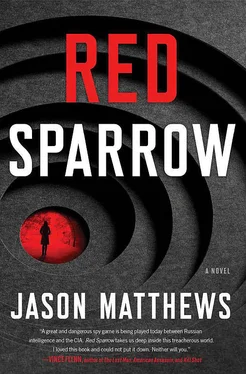Gable didn’t feel sorry for himself, it was operations. All this happened to him, but for the right reason. Listen up, the most important thing is your agent, his security, saving his life. It’s the only thing.
At about the same time, Forsyth had just concluded his own personal shitstorm, but had bounced back and landed in Helsinki. He heard Gable was fucked—that was nothing new—and sent for him as his number two, like the old days, only there aren’t any good old days, it’s a myth. The ecstatics at Headquarters were happy to let Gable go to Finland as DCOS, no one else wanted the job and they wanted him off the desk, bad influence.
“So here we are, three fuckups, in the field, operating near the fricking Arctic Circle. And you and me drinking beer in a Turkish hash house.” Gable finished his beer and yelled, “ Hesap .” When Tarik came out of the kitchen, Gable motioned to Nate. “He’s paying.” Nate laughed.
“Wait a minute,” said Nate. “What do you mean, Forsyth went through his own shitstorm? What happened to him?” Nate dug out a few euros and handed them to Tarik. “Keep the change.” Tarik smiled thinly, nodded to Gable, and retreated to the kitchen. “You overtipped, rookie,” said Gable. “Don’t let them get used to you paying out. Got to keep them hungry.” Gable got up and shrugged on his coat.
“Bullshit,” said Nate. “You paid that young Kurd five grand to get him out of Dodge, but even you admitted he was burned, useless. You didn’t have to pay him squat.” Nate looked at Gable as they turned out of the alley and walked in front of the train station. Gable avoided looking back at him, and Nate knew that Gable was more than just a tough guy. But he wasn’t going to test the limits anytime soon.
The air was cold and Nate flipped up the collar of his overcoat. “You didn’t answer me about Forsyth,” said Nate. “What’s the story?”
Gable ignored the question and continued walking down the sidewalk. “Do you know where the Russian Embassy is?” asked Gable. “China, Iran, Syria? You should be able to get in a car and drive directly to any one of them. You might have to exfil some poor bastard someday. I’ll give you a week to find ’em all.”
“Yeah, okay, no problem. But what about Forsyth? What happened?” Nate had to keep dodging around pedestrians on the snowy sidewalk as Gable bulled his way through the afternoon crowds. They got to a corner and waited to cross. Nate saw a coffee shop on the opposite side of the street. “Quick cup of coffee? Come on, I’ll buy.” Gable looked at Nate sideways and nodded.
Over coffee and a short brandy, Gable told the story. Forsyth was considered one of the shit-hot Chiefs of Station in the Service. Throughout his twenty-five-year career, Forsyth came up the ranks with a brilliant record. As a young officer he recruited the first-ever North Korean reporting asset. Before the Wall came down, he directed a Polish colonel who brought Forsyth the complete war plans for Warsaw Pact Southern Command. A few years later, he recruited the Georgian defense minister, who, in exchange for a Swiss bank account, arranged for a T-80 tank with the new reactive armor to be driven at 0300 across the shale beach at Batumi and up the ramp of a heavy landing craft leased by the CIA from the Romanians.
As he moved up, Forsyth was one of the senior managers who had done the work and knew what the Game was about. Case officers loved him. Ambassadors came to him for advice. Seventh-Floor suits at Headquarters trusted him, and at age forty-seven he was rewarded with the plum COS Rome job. Forsyth’s first year in Rome was, as expected, a solid success.
What no one expected was that politically savvy Tom Forsyth would tell the supercilious staff aide of a senator visiting Rome on a congressional delegation to shut up and listen instead of talking during a Station briefing. She had questioned the “condign wisdom” of a controversial and compartmented Rome Station operation. The twenty-three-year-old political science major from Yale with twenty months of experience on the Hill had moreover personally criticized Forsyth’s management of the case by saying she thought the “tradecraft employed was, in a word, subpar.” This elicited from the usually phlegmatic Forsyth a cryptic “Go fuck yourself,” which days later resulted in the Headquarters notification that the senator had complained, that Forsyth’s Rome assignment was curtailed, that he was being relieved for cause.
After the usual righteous letter of reprimand in Forsyth’s file, the Seventh Floor quietly offered Forsyth the COS Helsinki job. The offer was made to demonstrate to Congress that Headquarters sympathized with Forsyth’s reaction to fatuous oversight inflicted on hardworking field operators during Codel shopping junkets camouflaged as fact-finding trips. Offering Forsyth Helsinki was, in addition, an insincere and calculated offer because no one thought Forsyth would accept. The Station was one-sixth the size of Rome’s, in arguably the least important of four somewhat sleepy Scandinavian countries, a post for a junior COS. They expected Forsyth to decline, find a place to park himself, and leave in two years when he became eligible to retire.
“By accepting the assignment he basically told the Seventh Floor to go fuck themselves,” said Gable. “A half year later he got me as his deputy, and yesterday you arrive. Not that you’re a fuckup.” Gable laughed. “You’re just known as one.”
Gable saw Nate’s face, the faraway stare. Okay, he told himself, this kid has a worm in his guts. He’d seen it before, the talented case officer too fucking afeared for his rep and future to be able to relax and let it flow. That whey-faced Gondorf had rattled the kid, should be ashamed of himself, and now he and Forsyth had to get Nash thinking straight. He made a mental note to talk to the COS. The last thing Station needed was a c/o who didn’t know the right time to pull the recruitment trigger.
TARIK’S ADANA KEBAB
Purée red bell and hot peppers with salt and olive oil. Add purée to ground lamb, chopped onion, garlic and parsley, finely cubed butter, coriander, cumin, paprika, olive oil, salt, and pepper. Knead and shape into flat kebabs; grill until almost charred. Serve with grilled pide bread and thinly sliced purple onions sprinkled with lemon and sumac.
The white-and-blue Voskhodhydrofoil settled into the water and approached the dock in a trailing cloud of blue diesel smoke. Carrying a small suitcase, Dominika stepped onto the steep pontoon ramp on the edge of the tarry mudflats and walked up to a bus waiting on the gravel road above the river. Eleven young people—seven women and four men—trudged up the pier behind her. They were all silent and tired and put their bags down in front of the open baggage compartment of the bus. No one spoke, they didn’t glance at one another. Dominika turned and looked out over the wide Volga River, pine trees lining both sides down to the shoreline. The air was humid and the river smelled of diesel fuel. Three kilometers north, around a bend in the river, the steeples and minarets around the Kazan Kremlin could just be seen in the morning haze.
Dominika knew it was Kazan because they had driven through the city from the airfield, past all the highway signs. That meant they were in Tatarstan, still in European Russia. At midnight, they had flown seven hundred kilometers from Moscow to a darkened military airfield. Unlit signs had read BORISOGLEBSKOYE AERODROME and KAZAN STATE AIRCRAFT PLANT. They had silently boarded a bus, the star-cracked windows covered by stained gray curtains. They drove through quiet predawn streets to a waterfront pier, where they boarded the wallowing hydrofoil as the sun was coming up over the city.
Читать дальше












